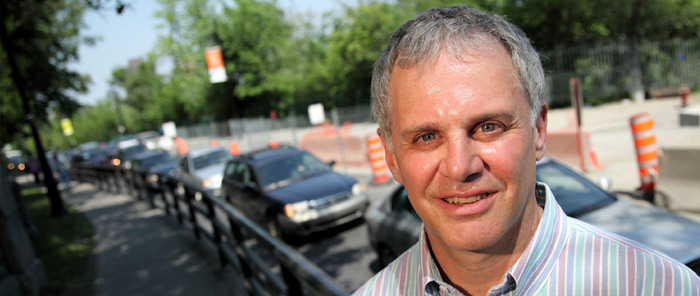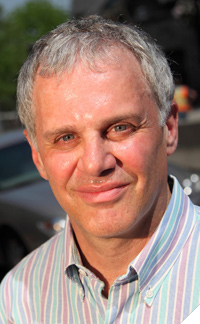
Groundbreaking study may help scientists pinpoint new risk factors for breast cancer


Dr. Mark Goldberg, a scientist at the Research Institute of the MUHC
In one sense, the story begins in the mid-1850s, when Dr. John Snow linked consumption of contaminated water to cholera outbreaks in London. For his work, Dr. Snow is often considered the father of environmental epidemiology, the study of how factors in the environment cause disease.
Fast forward to the modern age; humans have been living and working in environments where they are exposed to a range of chemicals, biological agents, and both non-ionizing and ionizing radiation. To understand the impact of today’s environment on health is the challenge facing environmental epidemiologists like Dr. Mark Goldberg, a scientist at the Research Institute of the MUHC. Dr. Goldberg and his colleagues recently published a groundbreaking study showing a connection between breast cancer and traffic-related air pollution.
Risk factors only identified in one third of breast cancer cases
“Breast cancer rates are increasing, but it’s not clear why,” says Dr. Goldberg. “While risk factors for some cancers are well understood, only about one third of breast cancers – the second leading cause of death from cancer in women – can be traced to known risk factors. We wanted to know if traffic-related air pollution could be a risk factor.”
For this study, Dr. Goldberg and his colleagues drew on data from several previous research projects. First, they developed air pollution “maps” of Montreal in 1986 and 1996. These maps showed levels of nitrogen dioxide – one of the gases that is a marker of pollution from cars and trucks – on each road in Montreal.
“Using data from a study that we carried out in 1996-97, we overlaid the home addresses of women diagnosed with breast cancer, and women who did not have breast cancer,” says Dr. Goldberg. “We found higher risks of breast cancer on streets with higher levels of air pollution.”
More research needed
Much more research is needed to clarify the relationship between traffic-related air pollution and breast cancer, according to Dr. Goldberg. For example, the study does not pinpoint the cancer-causing agents in air pollution. While it uses nitrogen dioxide as a ‘marker,’ this gas is only one of many by-products of cars and trucks – some of which are known carcinogens.
In addition to doing further studies on the air pollution and breast cancer link, Dr. Goldberg and his team are investigating the relationships between air pollution and other health concerns. “For example, we’ve established a strong connection between traffic-related air pollution and prostate cancer which needs to be verified with other studies” he says. “We’ve also been studying the relationship between short-term changes in air pollution and changes in health status amongst people with congestive heart disease; again we believe there is a link.”
Understanding the environmental causes of disease takes many years of careful study, but the payoff can be enormous. By conclusively linking cholera outbreaks to the consumption of contaminated water, Dr. Snow changed people’s habits all over the world – and saved countless lives. “Knowing what causes disease can be an important step towards preventing it,” says Dr. Goldberg. “That’s what epidemiology is all about.”